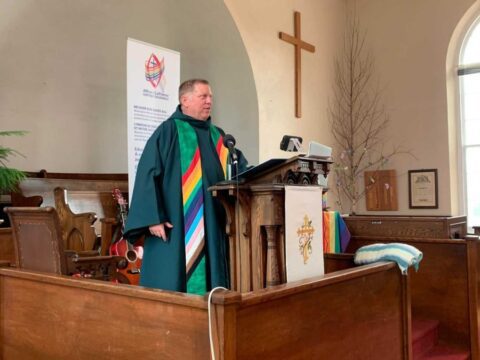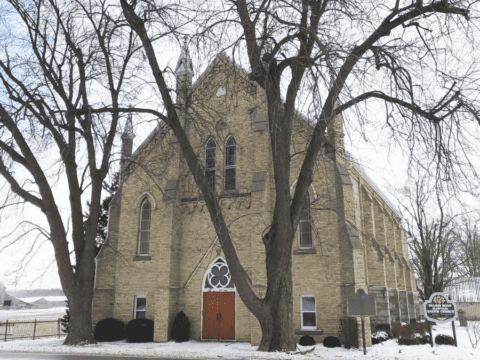The United Church of Canada’s General Council will make key decisions on how it governs itself at its annual meeting Saturday.
Held virtually, the meeting brings the General Council together to consider updates on the strategic plan, the anti-racism action plan, reconciliation and justice as well as reports from the National Indigenous Council and the Theology and Inter-Church, Inter-Faith Committee.
You may unsubscribe from any of our newsletters at any time.
Along with hearing from Moderator Carmen Lansdowne, the council will vote on proposals that address leadership for the 2020s, renounce claims to former mission properties in North Korea and establish a framework for principles-based justice work.
Leadership
The United Church has relied on Designated Lay Ministers (DLMs) since 2000 when they were first conceived as “a category of time-limited and localized lay leadership.” Now, however, DLMs function effectively as ordered ministers — though they practice without the same rights and recognition. Not only are DLMs paid less than ordered ministers, but they are limited to being appointed by a local ministry, and they are not eligible to be ordained. Those who are retired or are between appointments have no status as ministry personnel.
Meanwhile for churchgoers, a DLM’s ministry is no different than an ordered minister’s. All this has left DLMs feeling undervalued and hurt by the church.
“Over the years, what has happened is that most of the DLMs have discerned that their ministries are a lifelong call,” says Rev. Michael Blair, General Secretary of the United Church of Canada
On Saturday, the General Council will consider a proposal to eliminate “functional distinctions” between DLMs and ordered ministers by 2030. It provides solutions for current DLMs and candidates, a path to Testamur, lay ministry moving forward, future candidates without undergraduate degrees and those who retired as DLMs.
More on Broadview:
- Vote to let Indigenous church decide its future would show ‘we are our own elders’: gathering delegate
- United Church to share new national office space with Anglicans and Presbyterians
- United Church’s General Council Executive closed its doors on media. What now?
If the proposal passes, it will recognize the lifelong call of DLMs, allow them to go straight into training for ordered ministry and enable them to move around the country.
Blair notes the key challenge this proposal faces is that clergy who have spent significant time in formal education in order to prepare themselves for ordination may feel that the DLM training is “a bit light in comparison.” He expects the discussion at the meeting this weekend could be around generating an understanding that education combined with life experience is comparable to those who entered ministry through the ordered stream.
Former Mission Properties in North Korea
The result of a request from the Presbyterian Church in the Republic of Korea (PROK), a long-term partner of the United Church of Canada, General Council is to consider a proposal renouncing ownership claim to its former mission properties in the Democratic People’s Republic of Korea (North Korea).
In 2021, PROK adopted a declaration asking that properties left behind in the North be renounced as a move toward reconciling North and South Korea. Because the United Church of Canada owned mission properties in North Korea before the Korean War, the PROK urged it to respond to its request.
As PROK and other South Korean ecumenical bodies work toward peacebuilding in the two Koreas, they are concerned that property could become an issue in their negotiations. According to the proposal, the church views heeding PROK’s call as “a way of living out the United Church commitment to radical accompaniment, decolonizing partner relationships.”
The renunciation is “a symbolic gesture,” explains Blair, but part of that symbolism “is that rather than us imposing values, we allow the communities that we work with to offer leadership.”
Blair said there was a sense at the preparation session for the annual meeting held last Thursday that this is the right thing to do.
Principles-Based Justice Work
The Theology and Inter-Church Inter-Faith Committee has developed a principle-based approach to its justice work, to be considered at the weekend meeting. The proposal notes that some of the church’s policies reflect the time in which they were developed. The limits of these policies have caused the church to be “out of sync with the calls of partners and with rapidly changing global realities.”
Adopting a principles-based approach to justice work provides a consistent framework that enables “the church to respond more quickly to situations of injustice.”
“Right now, all our responses to any social justice initiatives or concern from partners are policy-based,” Blair notes, so when things shift, the church is unable to respond if there is no related policy in place.
The new principles would act “as a kind of sift” to help the church determine if it can respond to a request, join a sign-on or make a statement about a particular issue.
“It gives us flexibility of responding, and it doesn’t put us in a situation where we’re out of step.”
Should the General Council pass this proposal, the principles will be tested and reworked, as needed, over the next year and a half.
The General Council will also consider proposals to affirm assessment funding rates and principles for 2024 and to provide financial support for ministry personnel who are suspended while in a directed program.
***
Leslie Sinclair is a freelance journalist in Toronto.














